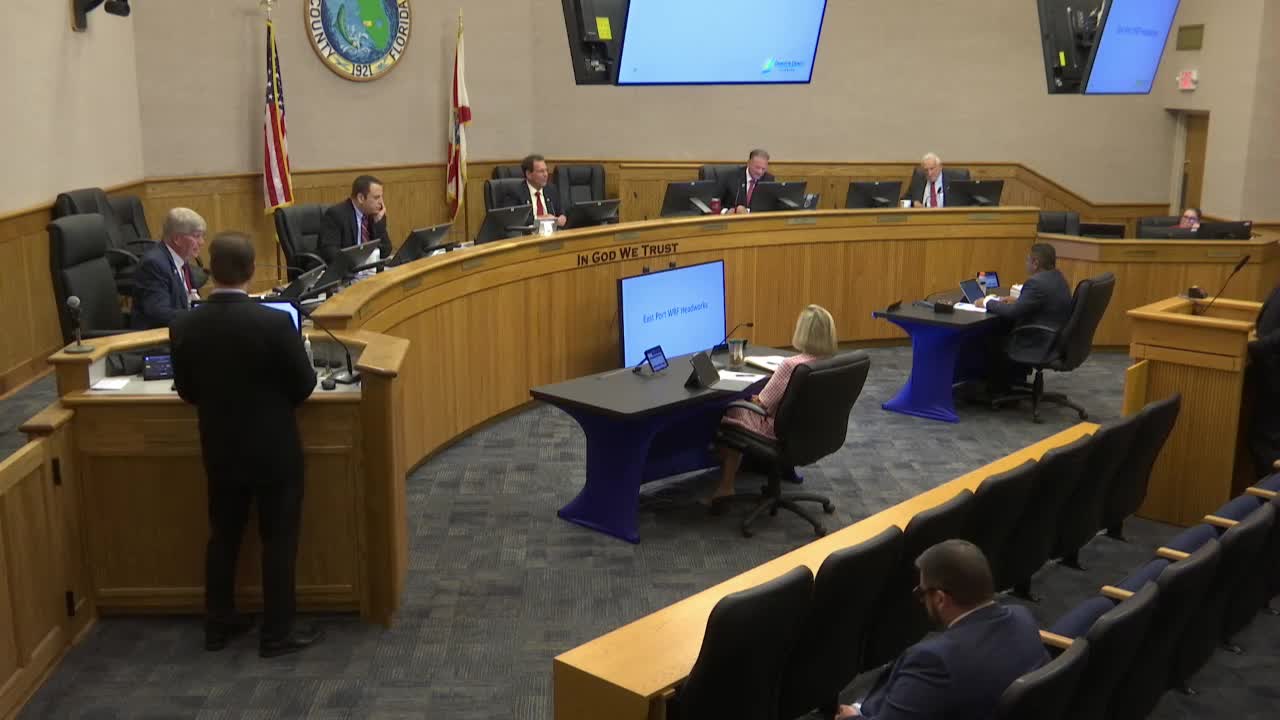Eastport WRF construction: commissioners approve headworks replacement and a disputed change-order amid schedule and cost concerns
Get AI-powered insights, summaries, and transcripts
Subscribe
Summary
Charlotte County commissioners on Oct. 14 approved a plan to replace the existing headworks at the Eastport Wastewater Reclamation Facility and debated multiple construction change orders to the Eastport WRF expansion contract.
Charlotte County commissioners on Oct. 14 approved a plan to replace the existing headworks at the Eastport Wastewater Reclamation Facility and debated a series of construction change orders on the larger Eastport expansion project.
What passed: The board approved a staff recommendation to build a new, higher-capacity headworks sized for 12 million gallons per day instead of merely rehabilitating the existing structure. County engineers and project consultants described extensive concrete and mechanical deterioration in the existing headworks caused by hydrogen sulfide and recurring high flows; staff said repairs would be short-lived and would not provide good life expectancy. The board accepted the recommendation to design and pursue a new headworks sized to connect directly to the planned future expansion; the staff estimate for the new headworks in the briefing was approximately $17.66 million (engineer’s internal estimate).
Change orders and an approved contract amendment: Commissioners debated seven project change orders for the Eastport WRF project, discussing a long list of specific contractor potential change orders (PCOs) that were shown in the agenda backup. Items ranged from unforeseen buried piping and non‑existent conduits to added drains, ventilation, and updated control/SCADA scope because the original integrator could not perform review due to a conflict. One change (Change Order 8) was brought to the board and added to the contract; after discussion and a motion to approve the dollar amount but deny added time, the board approved that change order by a 3–2 vote. County staff reported the project contingency used to date and remaining contingency balances; staff said the contract retains about $4+ million of contingency after the earlier items and the board-added change.
Board concerns: Several commissioners urged staff to provide line-item detail for each change order, to separate contractor-requested improvements from items staff ordered as betterments, and to clarify whether omissions were design errors, contractor omissions, or necessary owner-requested additions. Commissioners said they want clearer documentation of why items were not identified in the design and said change orders had added both cost and time to a project that the board was already under pressure to complete.
Context and schedule: The Eastport construction is a multi-part expansion; staff said the main construction remained in progress (about 73% complete on the expansion) and that the headworks replacement will be designed to allow the existing facility to operate while the new headworks is built. Staff said some of the change orders have been handled through the project contingency and other changes were presented to the board to be added to the contract.
Quotes from the record: Ken Stecker, utilities operations manager, summarized the cluster of PCOs and said some were needed for safety or to adjust to as-built conditions. Commissioner Doherty (board member) pressed staff, saying, “If your documents are not perfect, you get change orders…rarely are they perfect documents,” and asked the board and staff to tighten the process to avoid “nickel and diming” on contracts.
Next steps: Staff agreed to provide a detailed spreadsheet line-by-line for each change-order amount and whether the expense was owner-directed, design omission, or unforeseen subsurface condition. The engineering team will prepare final design documents for the 12-MGD headworks and present cost updates; the board approved moving forward with the new headworks option and asked for a clearer rolling total for the full Eastport project cost.
Ending: The board approved the new-headworks direction unanimously, and approved Change Order 8 (dollar amount but no added contract days) on a 3–2 vote. Commissioners asked for sharper internal controls on change orders and more detailed documentation when items are added to the contract by staff or contractor request.
